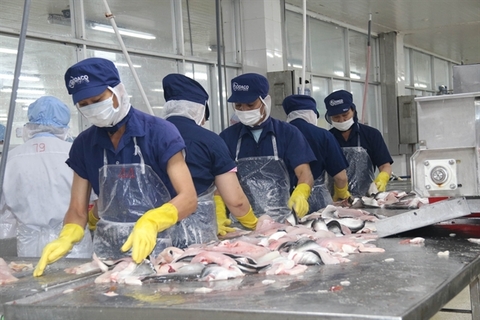
Tra fish being processed for export at a factory in Tien Giang Province. Vietnamese firms are urged to foster their exports to Asian and African markets in 2023. — VNA/VNS Photo Minh Tri
Vietnamese exporters need to ensure their capacity and maintain existing export markets, typically Asian and African outlets, amid many challenges in 2023, a senior trade official has said.
These challenges included a world economic recession, competition among major big economies, trade protectionism, inflation and rising interest rates, Le Hoang Oanh, Director of the Asia-Africa Market Department under the Ministry of Industry and Trade, said.
To do so, firms must make sure that their products meet the quality requirements of exported goods and shipped goods, which Asiam and African markets need rather than what they have, Oanh told congthuong.vn.
She said open export procedures, convenient logistics services, and updated information about the import policies of the host country would also be necessary to facilitate exports to these markets.
According to the official, ensuring raw materials would play a key role for exporters, especially those exporting textiles and garments to China and South Korea and others shipping seafood products to South Asia and Southeast Asia.
Input materials for production needed to be diversified to avoid dependence on one or several markets, she added.
In 2023, Oanh encouraged exporters to continue promoting their exports to some lucrative markets such as China and India. In China, firms should pay attention to the Yunnan market.
Guangxi and Yunnan have the same population of about 50 million people but the scale of Viet Nam's trade with Yunnan in 2022 reached only US$3.2 billion compared to the country's $30 billion trade with Guangxi, she explained.
Meanwhile, India is also a potential market with considerable purchasing power and market demand thanks to a population of 1.4 billion people. Annually, India imported about $560 billion worth of goods. However, Viet Nam's exports made up only 1.4 per cent of the country's total import value of $8 billion.
Besides the markets mentioned above, Oanh also advised exporters to look to African markets, which have much untapped opportunities for them to accelerate their exports, as Viet Nam only accounted for 0.6 per cent of Africa's import turnover worth $600 billion per year.
Viet Nam’s merchandise trade with Asia reached $475.29 billion in 2022, increasing by 9.6 per cent compared to 2021 and accounting for the highest proportion (65.1 per cent) in the country's total import-export value.
Major trade partners of Viet Nam in Asia include China, South Korea, Japan, and the Association of Southeast Asian Nations (ASEAN).
Last year, the value of imports and exports between Viet Nam and Africa was $8.1 billion, down 3.9 per cent. — VNS